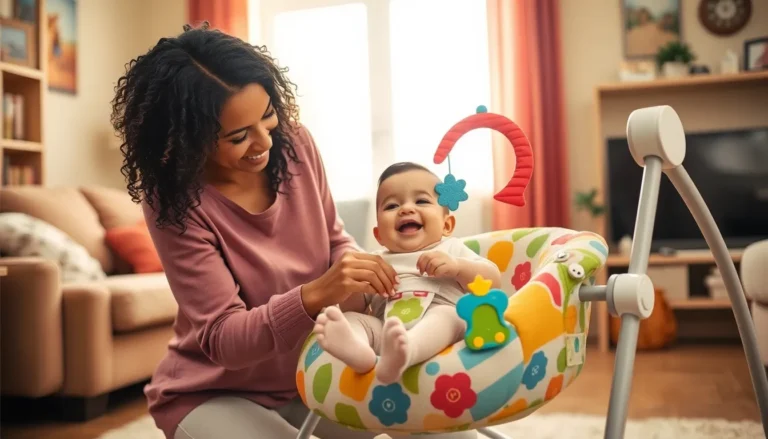Bringing a newborn home is like hosting a tiny, demanding VIP who’s just arrived from a very exclusive event—one where they were the star of the show. The excitement is palpable, but so are the questions. One of the most common queries new parents face is how long they should stay cocooned at home with their little bundle of joy. Spoiler alert: it’s not just about avoiding the outside world’s germs; it’s a rite of passage steeped in tradition and practicality.
While the exact number of days can vary, understanding the customs surrounding this special time can help new parents navigate the early days with confidence. Whether it’s bonding time or just figuring out how to properly swaddle that adorable little burrito, staying home is an essential part of the journey. So let’s dive into the delightful world of newborn home stays and discover what’s customary for moms and their precious little ones.
Table of Contents
ToggleImportance of Postpartum Care
Postpartum care plays a crucial role in a mother’s recovery. This period allows mothers to heal both physically and emotionally. Parents should prioritize rest and support during this time. Emotional well-being significantly impacts bonding with the newborn.
Support systems, such as family and friends, often provide essential help. They can assist with household tasks, enabling mothers to focus on recovery. Engaging with healthcare professionals ensures both mother and baby receive proper support. Monitoring physical changes helps detect any potential complications early.
Nutrition also serves as a key component in postpartum recovery. A balanced diet aids healing and boosts energy levels. Staying hydrated contributes to overall well-being. Regular check-ups allow healthcare providers to address any health concerns during recovery.
Time spent at home post-birth fosters parent-child attachment. Holding, cuddling, and interacting with the newborn enhances these bonds. Skin-to-skin contact offers benefits for both mother and baby. This nurturing environment supports a secure attachment.
Cultural customs may influence how long a family stays at home. Various traditions emphasize the importance of family support during this period. Learning about these practices can provide additional guidance to new parents.
Opportunity to learn and acquire parenting skills exists in the comfort of home. Parents gain confidence through hands-on experiences. Mastering skills like breastfeeding or changing diapers often occurs during this crucial time.
Overall, prioritizing postpartum care enhances the transition into parenthood. This phase paves the way for lasting family connections and positive outcomes for both mother and baby.
Cultural Practices Around Newborn Care
Different cultures approach the care of newborns in distinct ways. These practices influence how long mothers stay at home with their infants, shaping the bonding experience.
Varying Customs Globally
Countries across the world have unique traditions for postpartum care. In many Asian cultures, the practice of “confinement” is common. Mothers typically remain indoors for 30 to 40 days, allowing for physical recovery and bonding. Meanwhile, Scandinavian countries promote shared parental leave, encouraging both parents to engage actively. This helps establish early connections between the baby and family members.
Regional Differences in Stay Duration
Regional customs dictate varying durations for home stays. In the United States, most mothers stay for about six to eight weeks. This period allows ample time for recovery and adjustment. Conversely, in countries like Mexico, family often gathers to provide support during a month-long celebration known as “la cuarentena.” Such differences highlight the importance of cultural influences on newborn care and the significance of customs in fostering family bonds and support systems.
Recommended Duration for Home Stay
A home stay after childbirth plays a vital role in recovery and bonding. Specific durations are often recommended based on professional guidelines and cultural practices.
Guidelines from Health Professionals
Healthcare providers typically suggest a home stay of six to eight weeks for new mothers and their babies. During this time, parents focus on healing and building familiarity with their newborns. Frequent check-ups are essential to monitor the mother’s physical recovery and the baby’s growth. Prioritizing rest can significantly help mothers regain strength. Pediatricians advise practicing skin-to-skin contact to enhance emotional connections. Support from family and friends encourages easier transitions into parenthood.
Factors Influencing Duration
Variations in cultural practices significantly impact how long mothers stay at home. For instance, Asian traditions often advocate a 30 to 40-day confinement, emphasizing recovery and bonding. Scandinavian customs promote shared parental leave, thereby ensuring both parents engage fully with the newborn. Personal circumstances also play a role; mothers may choose longer stays based on support systems or previous experiences. Economic factors can influence choices surrounding home leave duration. Ultimately, each family’s unique situation shapes their approach to this important transition.
Benefits of Staying Home
Staying home with a newborn fosters essential bonding opportunities. New parents benefit from daily interactions that promote emotional connections. Skin-to-skin contact enhances attachment, supporting both physical and emotional health. Regular engagement with the baby supports developmental milestones during this critical period.
Postpartum recovery is pivotal for mothers, emphasizing the importance of rest and support. Prioritizing self-care allows mothers to heal physically and mentally after childbirth. Nutrition plays a crucial role, as a balanced diet and hydration boost recovery and energy levels.
Having family and friends nearby cultivates a strong support system. Encouragement from loved ones helps reduce stress during the adjustment to parenthood. Engaging with healthcare professionals ensures any concerns are promptly addressed, further supporting maternal health.
Cultural practices significantly influence the home stay experience. Many Asian cultures advocate for a confinement period of 30 to 40 days, dedicated to recovery and bonding. In Scandinavian countries, shared parental leave encourages both parents to partake in newborn care, enhancing family dynamics.
The typical stay in the U.S. spans six to eight weeks. This timeframe allows parents to familiarize themselves with their babies while healing. Frequent check-ups during this period monitor health and growth, reinforcing the importance of support and care in early parenting. Each family’s approach to postpartum home stays reflects unique cultural, personal, and economic factors, contributing to effective parenting practices.
Challenges and Considerations
New parents face various challenges during the first weeks at home with their newborn. Balancing recovery and care for the baby often presents obstacles. Fatigue can quickly set in, making it essential for mothers to prioritize rest. Seeking help from family and friends allows for moments of recuperation while ensuring the new baby remains well cared for.
Physical recovery takes time and may involve managing discomfort or postpartum conditions. Engaging healthcare professionals for regular check-ups supports monitoring of both mother and baby’s health, encouraging a smooth transition. Emotional well-being also requires attention, as postpartum mood changes can affect parenting dynamics.
Cultural norms significantly influence duration at home. The confinement practices observed in many Asian cultures encourage mothers to remain indoors for 30 to 40 days, which aids recovery and bonding. In contrast, shared parental leave in Scandinavian countries promotes equal involvement from both parents. Such variations demonstrate how cultural considerations directly impact parenting experiences.
Family dynamics serve as another factor. Single parents often have different support systems than those in family units, influencing the support available during the early weeks. Economic conditions may further dictate how long families can stay at home; some may require early returns to work for financial stability.
Overall, these challenges and considerations shape the decisions surrounding how long families stay home with newborns. The combination of recovery, cultural practices, and support systems ultimately dictates the family’s experience during this critical period.
The time spent at home with a newborn is a unique and transformative period for families. It offers a vital opportunity for bonding and recovery. Each family’s experience varies based on cultural practices and personal circumstances.
Prioritizing postpartum care is essential for mothers as they navigate this new chapter. With the right support and a focus on self-care, new parents can create a nurturing environment for their baby.
Ultimately, the duration of this home stay should align with what feels best for the family, ensuring both mother and child thrive during this critical time. Embracing this journey fosters lasting connections and sets the foundation for future growth.



